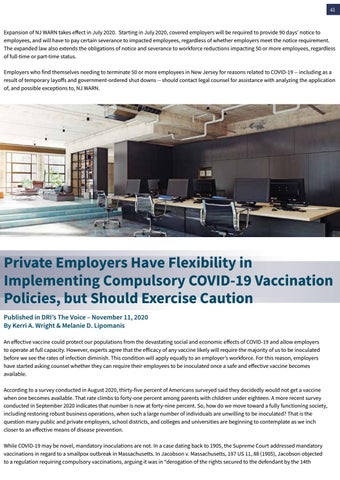41
Expansion of NJ WARN takes effect in July 2020. Starting in July 2020, covered employers will be required to provide 90 days’ notice to employees, and will have to pay certain severance to impacted employees, regardless of whether employers meet the notice requirement. The expanded law also extends the obligations of notice and severance to workforce reductions impacting 50 or more employees, regardless of full-time or part-time status. Employers who find themselves needing to terminate 50 or more employees in New Jersey for reasons related to COVID-19 -- including as a result of temporary layoffs and government-ordered shut downs -- should contact legal counsel for assistance with analyzing the application of, and possible exceptions to, NJ WARN.
Private Employers Have Flexibility in Implementing Compulsory COVID-19 Vaccination Policies, but Should Exercise Caution Published in DRI’s The Voice – November 11, 2020 By Kerri A. Wright & Melanie D. Lipomanis An effective vaccine could protect our populations from the devastating social and economic effects of COVID-19 and allow employers to operate at full capacity. However, experts agree that the efficacy of any vaccine likely will require the majority of us to be inoculated before we see the rates of infection diminish. This condition will apply equally to an employer’s workforce. For this reason, employers have started asking counsel whether they can require their employees to be inoculated once a safe and effective vaccine becomes available. According to a survey conducted in August 2020, thirty-five percent of Americans surveyed said they decidedly would not get a vaccine when one becomes available. That rate climbs to forty-one percent among parents with children under eighteen. A more recent survey conducted in September 2020 indicates that number is now at forty-nine percent. So, how do we move toward a fully functioning society, including restoring robust business operations, when such a large number of individuals are unwilling to be inoculated? That is the question many public and private employers, school districts, and colleges and universities are beginning to contemplate as we inch closer to an effective means of disease prevention. While COVID-19 may be novel, mandatory inoculations are not. In a case dating back to 1905, the Supreme Court addressed mandatory vaccinations in regard to a smallpox outbreak in Massachusetts. In Jacobson v. Massachusetts, 197 US 11, 88 (1905), Jacobson objected to a regulation requiring compulsory vaccinations, arguing it was in “derogation of the rights secured to the defendant by the 14th

















